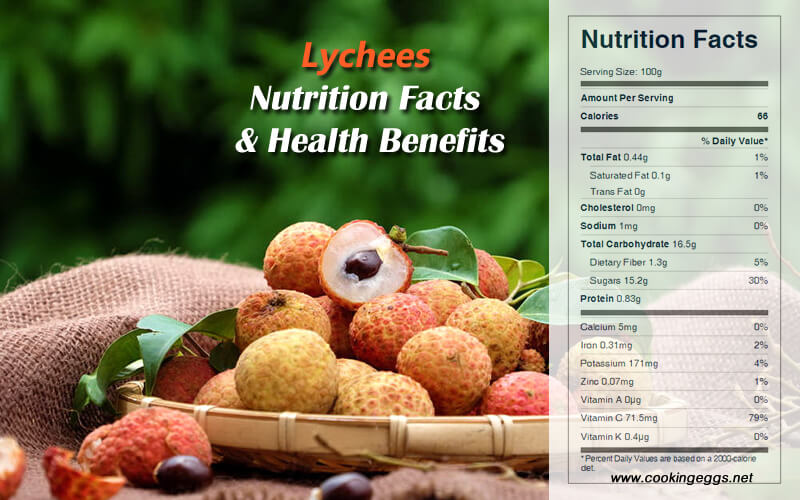Lychees Nutrition Facts & Health Benefits
Lychee (also spelled Litchi or Litchee) is a tropical fruit native to South China. Lychee is a very delicious fruit. The fruit was used as a delicacy in the ancient Chinese Imperial Court.
Lychee is a sweet fruit just smaller than walnut, with flavor reminiscent of grapes and aroma like rose. The lychee fleshy fruits' edible portion is an aril, surrounding one dark brown inedible seed. The inner seed is not edible.
The nutritional value of lychee
Raw lychee fruit is 69% water, 17% carbohydrates, 1% protein, and contains negligible fat. The raw lychee is rich in vitamin C, having 72 mg per 100 grams – an amount representing 79% of the Daily Value – but contains no other micronutrients of significant content.
Ten medium raw lychees provide 66 calories, 16.5 g carbohydrate, 0.8 g protein, 0.4 g fat, 1.3 g dietary fiber, 72 mg vitamin C, 14 mcg folic acid, 171 mg potassium, 5 mg calcium, 31 mg phosphorus, and 10 mg magnesium.

Raw Lychees Nutrition Facts Label
Health Benefits of Lychees
Lychee is considered a blood and yin tonic that improves the circulation of energy. The fruits are used to relieve asthma, cough, diarrhea, hernial pain, tumors, and glandular enlargements. The nuts are used in Oriental medicine to enhance intelligence and make one's complexion more beautiful.
Like citrus fruits, lychee is an excellent source of vitamin C; 100 g of fresh fruit provides 71.5 mg of vitamin C. Studies suggest that consumption of fruits rich in vitamin C helps the human body develop resistance against infectious agents and scavenge free radicals.
Lychees have moderate amounts of polyphenols, including flavan-3-ol monomers and dimers as major compounds, representing about 87% of total polyphenols, which declined in content during storage or browning. Lychees naturally produce butylated hydroxytoluene. Cyanidin-3-glucoside represented 92% of total anthocyanins, contributing to the protection of blood lipids from oxidative damage.
It is a good source of B-complex vitamins such as thiamin, niacin, and folates. These vitamins are essential since they function by acting as co-factors to help the body metabolize carbohydrates, protein, and fats.
Lychee fruit is a good source of copper and phosphorus. In traditional Chinese medicine, lychees are used as a pain reliever, as an aid to digestion, and to promote health and long life. They were also used as a treatment for coughs, sore throats, and swollen glands.
Two Chinese studies have suggested that lychee has potential as a cancer-fighting agent. Research at Zhejiang Gongshang University in Hangzhou, China, found that polyphenols from lychee fruit pulp appeared to slow the growth and proliferation of cancer cells. It appeared to be especially effective against human breast cancer. A second study, at Sichuan University in Chengdu, China, also showed lychee polyphenols to inhibit the growth of liver cancer cells. Although the research has not established that the lychee flavonoids work the same way inside the human body, the implications are hopeful.
Health Risk
Lychee seeds contain methylene cyclopropyl glycine, which can cause hypoglycemia associated with outbreaks of encephalopathy in undernourished Indian and Vietnamese children who have consumed lychee fruit.